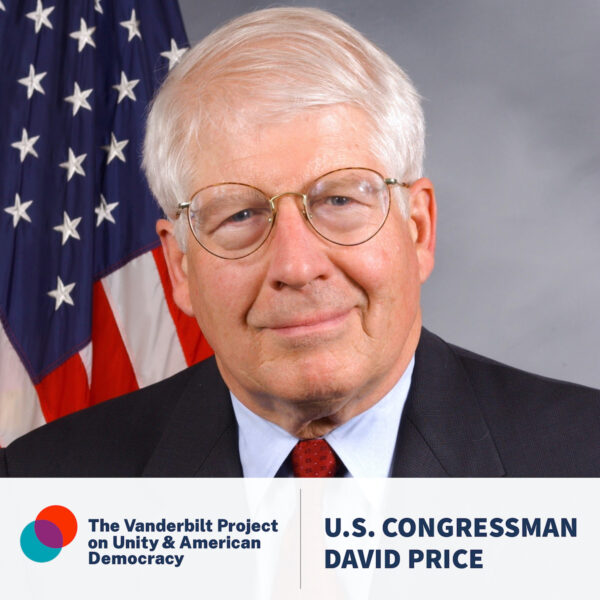U.S. Rep. David Price, who has represented the fourth district of North Carolina through seven White House administrations, shared insights about the changes he has witnessed in Congress during an online discussion with Vanderbilt political scientists Alan Wiseman and Larry Bartels on June 28. The virtual event was part of a series hosted by the Vanderbilt Project on Unity and American Democracy.
 Along with being a lawmaker for the past 35 years, Price has a Ph.D. in political science from Yale University and is the author of multiple books, including his most recent, the fourth edition of The Congressional Experience: An Institution Transformed, in which he addresses the challenges, elations and deep concerns that have arisen while serving as a member of the contemporary Congress.
Along with being a lawmaker for the past 35 years, Price has a Ph.D. in political science from Yale University and is the author of multiple books, including his most recent, the fourth edition of The Congressional Experience: An Institution Transformed, in which he addresses the challenges, elations and deep concerns that have arisen while serving as a member of the contemporary Congress.
Price said that some lawmakers come to Washington, D.C., as partisans, strictly loyal to their “team” instead of working to cultivate relationships with other lawmakers. Others are more focused on their external social media community. Both of these groups are investing less in the institution.
“The effectiveness of Congress still depends on members’ willingness to invest time, energy and staff resources in policy initiatives. But the incentive to seek such a role has become weaker and the path to success more difficult in the modern House,” Price said. “For a member who comes to the Congress wanting to make an impact on national policy, I do think it’s a place where that’s still possible.”
He said that this shift to “blind loyalty” is deepening the political divide.
“We need to live somewhere between blind institutional patriotism on the one hand and unrelenting criticism on the other,” he said. “Life in Congress calls for a more nuanced view, and for some that’s tricky.”
Imperial presidency
Price said he’s seen historical trends for decades toward what historians call the “imperial presidency”—the president’s taking a dominant role over other branches of government in domestic and foreign policy. But it was most apparent during the Trump era.
“President Trump pushed his powers to the limit and then some, and we [Congress] needed to respond,” he said.
Representative democracy
Price addressed a viewer’s question about what it really means to be a representative in government and how some lawmakers wrestle with their role once they make it to Washington.
“I wouldn’t be where I am or wouldn’t stay here very long if there wasn’t some kind of congruence between the views in my district and my own views. And I couldn’t live with myself if there wasn’t some congruence between my own conscientious convictions and the kind of political views I find myself being urged to take on by my constituents,” Price said. “Representative government is a process of interpretation and explanation. It’s a two-way process.”
When asked what role individual citizens have in helping to bring about civility in politics, Price insisted that, just like politicians, voters have to decide whether to contribute to finding consensus or to fan the flames of division.
“I know this sounds lofty, but the founders of this country insisted on what they called ‘civic virtue.’ A democracy requires that you have some capacity and some willingness to think beyond just your own interests and to think about the common good of the society and to act on behalf of that vision. It’s a responsibility of citizens as well as elected officials.”
- See other discussions sponsored by The Vanderbilt Project on Unity and American Democracy.
- Learn more about Price’s book The Congressional Experience: An Institution Transformed